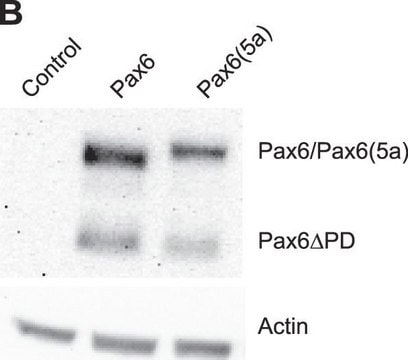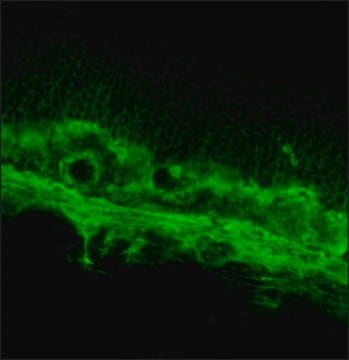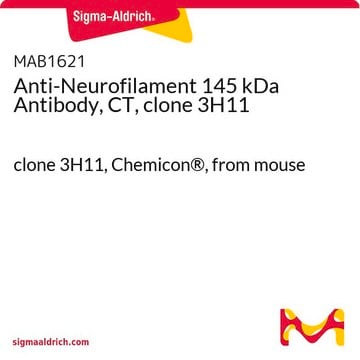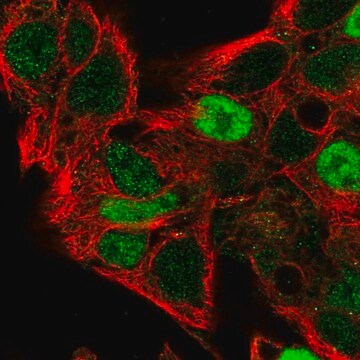おすすめの製品
由来生物
mouse
品質水準
抗体製品の状態
ascites fluid
抗体製品タイプ
primary antibodies
クローン
AD1.5, monoclonal
化学種の反応性
zebrafish, rat, human, chicken, mouse
メーカー/製品名
Chemicon®
テクニック
immunohistochemistry: suitable
western blot: suitable
アイソタイプ
IgG1
NCBIアクセッション番号
UniProtアクセッション番号
輸送温度
dry ice
ターゲットの翻訳後修飾
unmodified
遺伝子情報
human ... PAX6(5080)
特異性
Recognizes Pax6.
免疫原
Recombinant human Pax6.
アプリケーション
Research Category
ニューロサイエンス
ニューロサイエンス
Research Sub Category
ニューロン発生
神経細胞及びグリアマーカー
ニューロン発生
神経細胞及びグリアマーカー
Anti-Pax6 Antibody, clone AD1.5 is an antibody against Pax6 for use in IH & WB.
Western blot. The antibody recognizes the 46 and 48 kDa Pax6 proteins.Immunohistochemistry on frozen tissue sections.Optimal working dilutions must be determined by end user.
ターゲットの説明
46 & 48 kDa
物理的形状
Unpurified
Ascites fluid containing no preservatives.
保管および安定性
Maintain for 1 year at -20°C from date of shipment. Aliquot to avoid repeated freezing and thawing. For maximum recovery of product, centrifuge the original vial after thawing and prior to removing the cap.
アナリシスノート
Control
Embryonic eye tissue
Embryonic eye tissue
その他情報
This product can not be purchased for resale.
Concentration: Please refer to the Certificate of Analysis for the lot-specific concentration.
法的情報
CHEMICON is a registered trademark of Merck KGaA, Darmstadt, Germany
免責事項
Unless otherwise stated in our catalog or other company documentation accompanying the product(s), our products are intended for research use only and are not to be used for any other purpose, which includes but is not limited to, unauthorized commercial uses, in vitro diagnostic uses, ex vivo or in vivo therapeutic uses or any type of consumption or application to humans or animals.
Not finding the right product?
Try our 製品選択ツール.
保管分類コード
10 - Combustible liquids
WGK
WGK 1
引火点(°F)
Not applicable
引火点(℃)
Not applicable
適用法令
試験研究用途を考慮した関連法令を主に挙げております。化学物質以外については、一部の情報のみ提供しています。 製品を安全かつ合法的に使用することは、使用者の義務です。最新情報により修正される場合があります。WEBの反映には時間を要することがあるため、適宜SDSをご参照ください。
Jan Code
MAB5554:
試験成績書(COA)
製品のロット番号・バッチ番号を入力して、試験成績書(COA) を検索できます。ロット番号・バッチ番号は、製品ラベルに「Lot」または「Batch」に続いて記載されています。
Sergey Malchenko et al.
Gene, 534(2), 400-407 (2013-08-21)
In vitro neural differentiation of human embryonic stem cells (hESCs) is an advantageous system for studying early neural development. The process of early neural differentiation in hESCs begins by initiation of primitive neuroectoderm, which is manifested by rosette formation, with
Caroline A Johnson et al.
Development (Cambridge, England), 147(4) (2020-02-01)
Cellular and molecular mechanisms underlying the switch from self-amplification of cortical stem cells to neuronal and glial generation are incompletely understood, despite their importance for neural development. Here, we have investigated the role of the transcription factor specificity protein 2
Louise Thiry et al.
Communications biology, 7(1), 238-238 (2024-02-29)
The fatal motor neuron (MN) disease Amyotrophic Lateral Sclerosis (ALS) is characterized by progressive MN degeneration. Phrenic MNs (phMNs) controlling the activity of the diaphragm are prone to degeneration in ALS, leading to death by respiratory failure. Understanding of the
Christen M Crosta et al.
Molecular and cellular neurosciences, 109, 103562-103562 (2020-09-29)
Abnormal dendritic arbor development has been implicated in a number of neurodevelopmental disorders, such as autism and Rett syndrome, and the neuropsychiatric disorder schizophrenia. Postmortem brain samples from subjects with schizophrenia show elevated levels of NOS1AP in the dorsolateral prefrontal
Ramsey Najm et al.
Cell reports, 32(4), 107962-107962 (2020-07-30)
Despite its clear impact on Alzheimer's disease (AD) risk, apolipoprotein (apo) E4's contributions to AD etiology remain poorly understood. Progress in answering this and other questions in AD research has been limited by an inability to model human-specific phenotypes in
ライフサイエンス、有機合成、材料科学、クロマトグラフィー、分析など、あらゆる分野の研究に経験のあるメンバーがおります。.
製品に関するお問い合わせはこちら(テクニカルサービス)![Anti-OCT-4 [POU5F1] Antibody, clone 7F9.2 clone 7F9.2, from mouse](/deepweb/assets/sigmaaldrich/product/images/307/874/7354f72d-80ee-40a5-b7fa-0590fe6784cc/640/7354f72d-80ee-40a5-b7fa-0590fe6784cc.jpg)







